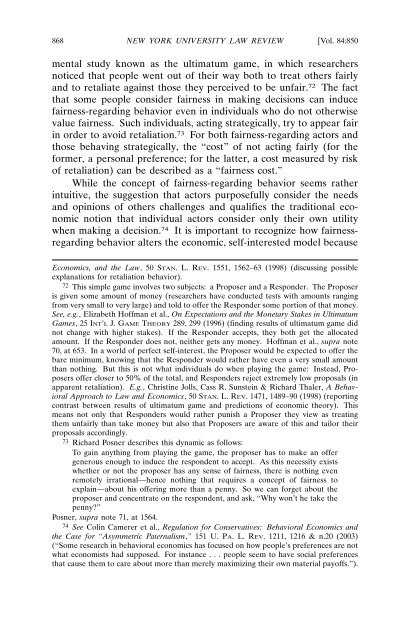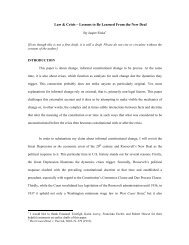In Search of an Enforceable Medical Malpractice Exculpatory
In Search of an Enforceable Medical Malpractice Exculpatory
In Search of an Enforceable Medical Malpractice Exculpatory
Create successful ePaper yourself
Turn your PDF publications into a flip-book with our unique Google optimized e-Paper software.
868 NEW YORK UNIVERSITY LAW REVIEW [Vol. 84:850<br />
mental study known as the ultimatum game, in which researchers<br />
noticed that people went out <strong>of</strong> their way both to treat others fairly<br />
<strong>an</strong>d to retaliate against those they perceived to be unfair. 72 The fact<br />
that some people consider fairness in making decisions c<strong>an</strong> induce<br />
fairness-regarding behavior even in individuals who do not otherwise<br />
value fairness. Such individuals, acting strategically, try to appear fair<br />
in order to avoid retaliation. 73 For both fairness-regarding actors <strong>an</strong>d<br />
those behaving strategically, the “cost” <strong>of</strong> not acting fairly (for the<br />
former, a personal preference; for the latter, a cost measured by risk<br />
<strong>of</strong> retaliation) c<strong>an</strong> be described as a “fairness cost.”<br />
While the concept <strong>of</strong> fairness-regarding behavior seems rather<br />
intuitive, the suggestion that actors purposefully consider the needs<br />
<strong>an</strong>d opinions <strong>of</strong> others challenges <strong>an</strong>d qualifies the traditional economic<br />
notion that individual actors consider only their own utility<br />
when making a decision. 74 It is import<strong>an</strong>t to recognize how fairnessregarding<br />
behavior alters the economic, self-interested model because<br />
Economics, <strong>an</strong>d the Law, 50 STAN. L. REV. 1551, 1562–63 (1998) (discussing possible<br />
expl<strong>an</strong>ations for retaliation behavior).<br />
72 This simple game involves two subjects: a Proposer <strong>an</strong>d a Responder. The Proposer<br />
is given some amount <strong>of</strong> money (researchers have conducted tests with amounts r<strong>an</strong>ging<br />
from very small to very large) <strong>an</strong>d told to <strong>of</strong>fer the Responder some portion <strong>of</strong> that money.<br />
See, e.g., Elizabeth H<strong>of</strong>fm<strong>an</strong> et al., On Expectations <strong>an</strong>d the Monetary Stakes in Ultimatum<br />
Games, 25 INT’L J. GAME THEORY 289, 299 (1996) (finding results <strong>of</strong> ultimatum game did<br />
not ch<strong>an</strong>ge with higher stakes). If the Responder accepts, they both get the allocated<br />
amount. If the Responder does not, neither gets <strong>an</strong>y money. H<strong>of</strong>fm<strong>an</strong> et al., supra note<br />
70, at 653. <strong>In</strong> a world <strong>of</strong> perfect self-interest, the Proposer would be expected to <strong>of</strong>fer the<br />
bare minimum, knowing that the Responder would rather have even a very small amount<br />
th<strong>an</strong> nothing. But this is not what individuals do when playing the game: <strong>In</strong>stead, Proposers<br />
<strong>of</strong>fer closer to 50% <strong>of</strong> the total, <strong>an</strong>d Responders reject extremely low proposals (in<br />
apparent retaliation). E.g., Christine Jolls, Cass R. Sunstein & Richard Thaler, A Behavioral<br />
Approach to Law <strong>an</strong>d Economics, 50 STAN. L. REV. 1471, 1489–90 (1998) (reporting<br />
contrast between results <strong>of</strong> ultimatum game <strong>an</strong>d predictions <strong>of</strong> economic theory). This<br />
me<strong>an</strong>s not only that Responders would rather punish a Proposer they view as treating<br />
them unfairly th<strong>an</strong> take money but also that Proposers are aware <strong>of</strong> this <strong>an</strong>d tailor their<br />
proposals accordingly.<br />
73 Richard Posner describes this dynamic as follows:<br />
To gain <strong>an</strong>ything from playing the game, the proposer has to make <strong>an</strong> <strong>of</strong>fer<br />
generous enough to induce the respondent to accept. As this necessity exists<br />
whether or not the proposer has <strong>an</strong>y sense <strong>of</strong> fairness, there is nothing even<br />
remotely irrational—hence nothing that requires a concept <strong>of</strong> fairness to<br />
explain—about his <strong>of</strong>fering more th<strong>an</strong> a penny. So we c<strong>an</strong> forget about the<br />
proposer <strong>an</strong>d concentrate on the respondent, <strong>an</strong>d ask, “Why won’t he take the<br />
penny?”<br />
Posner, supra note 71, at 1564.<br />
74 See Colin Camerer et al., Regulation for Conservatives: Behavioral Economics <strong>an</strong>d<br />
the Case for “Asymmetric Paternalism,” 151 U. PA. L. REV. 1211, 1216 & n.20 (2003)<br />
(“Some research in behavioral economics has focused on how people’s preferences are not<br />
what economists had supposed. For inst<strong>an</strong>ce . . . people seem to have social preferences<br />
that cause them to care about more th<strong>an</strong> merely maximizing their own material pay<strong>of</strong>fs.”).
















